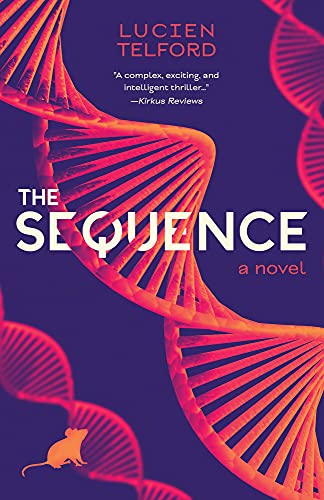
The Sequence received a 4+ star review, making it an IndieReader Approved title.
Following find an interview with author Lucien Telford.
What is the name of the book and when was it published?
The book’s title is The Sequence and it was published in August 2021.
What’s the book’s first line?
“Through the windshield of his Arethusa, the GAFA sprawled in all its darkened desert nothingness—the Great African Fuck All.”
What’s the book about? Give us the “pitch”.
The book weaves together the stories of a mercenary flying contraband for the mob, a geneticist creating human genetic edits in a moral gray area, and a pair of Hong Kong homicide detectives investigating a series of murder victims that turn out to be genetically edited.
What inspired you to write the book? A particular person? An event?
The discovery of CRISPR and the possibilities that lay ahead of us as a species that has access to, and the ability to edit our genetic makeup. Scientific discoveries often lead to unintended uses, and I wanted to explore where human gene editing could take us in the next hundred years.
What’s the main reason someone should really read this book?
The book is, at its core, a fast-paced, sci-fi thriller. But it also asks some intriguing ethical questions about the future of genetic engineering.
What’s the most distinctive thing about the main character? Who-real or fictional-would you say the character reminds you of?
Dallas Ward has an unending tenacity and perseverance that pushes him to continue moving towards his goals while facing impossible odds. He’s an overachiever with a spotted past and a drug habit, who transports contraband for the mob. Perhaps like a combination of Hunter S. Thompson in Fear and Loathing and Han Solo.
When did you first decide to become an author?
Somewhere around 2015. I had started writing down some of my internal dialogue and enjoyed re-reading it, so I looked into some creative writing courses online, and took it from there.
Is this the first book you’ve written?
Yes!
What do you do for work when you’re not writing?
I fly 737’s for a Canadian Airline.
How much time do you generally spend on your writing?
I think my best work comes from longer sessions. After a couple of hours of continuous work I find myself immersed in the world, and I’m able to view that world through my characters’ eyes and simply write what they see and do.
What’s the best and the hardest part of being an indie?
The best part is the total control I have over my content and distribution. The hardest is without any question promotion. I had no concept of how much work goes into getting a book in front of a large audience.
What’s a great piece of advice that you can share with fellow indie authors?
Revise revise revise. Make sure your work is the best it could possibly be. Make every sentence pay rent! Without good content, all the marketing in the world won’t help sell bad writing.
Would you go traditional if a publisher came calling? If so, why?
As long as the offer was right for me. I’m interested in the broader audience a traditional publisher could get my books out to and the time that would free up for me to continue writing.
Is there something in particular that motivates you (fame? fortune?)
I enjoy the process of bringing life to ideas that only exist in my mind, and sharing them with my readers. It allows the characters and their stories to become something far greater than a faint concept reappearing in my imagination.
Which writer, living or dead, do you most admire?
Without a doubt, William Gibson.
Which book do you wish you could have written?
I’d never want to take credit for someone else’s work, or claim to have done it better than they. So let’s say I wish I could have written a detective novel that takes place in a future America that has withdrawn from the global narrative and become a hermit state.
